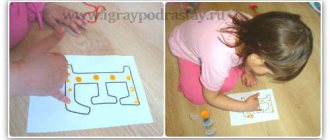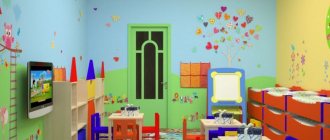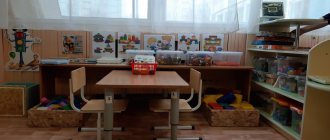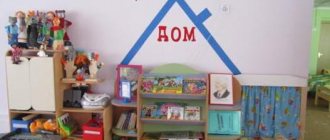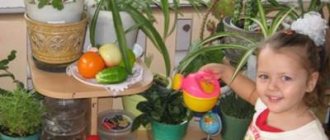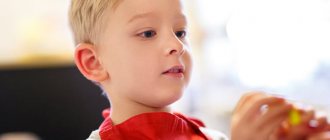Principles for forming the names of children's development centers
There are a large number of different options for names for children's development centers, both associative and not related to the institution's activity profile. A detailed analysis of the names of existing centers allows us to determine the basic principles of their formation, outlined below. After familiarizing yourself with them, as well as with numerous examples, you can create an original and successful name for your own business.
- Names associated with intelligence and the activities of a children's development center. Popular options are those that use keywords related to mind, intelligence and knowledge (“Nauchilus”, “KRUGOZOR”, “Poznavaika”, “I am a Genius”). The names of famous scientists sound interesting and original (“Socratic”, “Pythagoras”, “Da Vinci”, “Little Einsteins)”. In addition, associative names can reflect the specifics of the center’s work, the programs and approaches used (“Menard”, “The Magical World of Montessori”, “Linguisticum”).
- Titles related to cartoons and fairy tales. Since the activities of children's development centers are aimed at the child, most of their names are related specifically to children's topics. These are the bright and memorable names associated with cartoons, fairy tales and their characters (“Cheerful Cheburashka”, “Cheshire Cat”, “Gingerbread House”, “BARMALEYKIN”).
- Names related to childhood and children. This group includes, first of all, options that include different combinations with the word “childhood” (“Island of Childhood”, “Childhood Time”, “Miracle of Childhood”, “CHILDHOOD ACADEMY”) and the words “kids”, “baby”, “ child” (“Bravo Kids”, “Kids Up”, “BABY BOOM”, “It’s a child”). In addition, many variants of names that do not contain keywords evoke direct associations in visitors with childhood and children (“Toddlers”, “Daughters - Sons”, “Mama’s Joy”, “Egoza”).
- Other original titles. Many entrepreneurs prefer to choose a name that does not evoke obvious associations with the activities of the development center, but is easy to remember and evokes positive emotions (“Smile”, “Bright Start”, “Rainbow”).
Parents' club as one of the forms of effective interaction with families
Dear friends, we are pleased to introduce you to Ginyatullina Fanuza Anisovna, teacher at MBDOU No. 5 “Golden Key” urban settlement. Aktobe Republic of Tatarstan. Today Fanuza Anisovna is happy to share with us useful material about the interaction between preschool educational institutions and families. The article will be of interest to educators seeking to improve and diversify forms of cooperation with parents.
Brief commentary on the article from Fanuz Anisovna:
“The family is the primary source and model for the formation of a child’s interpersonal relationships, and dad and mom are role models. There is no other such institution, except the institution of the family, which so accurately predetermines the patterns of formation of the future person. Parents, not having sufficient knowledge of the age and individual characteristics of the child’s development, sometimes raise the child blindly, intuitively. All this does not bring the desired results. The goal of teachers is to create a unified space for the development of the child in the family and preschool educational institutions, to make parents participants in a full-fledged educational process.”
Useful reading...
Parents' club as one of the forms of effective interaction with families
The family is the primary source and model for the formation of a child’s interpersonal relationships, and dad and mom are role models. There is no other such institution, except the institution of the family, which so accurately predetermines the patterns of formation of the future person. Behind behavioral problems and the characteristics of children's relationships, adults are visible - their views on the world, their positions and behavioral stereotypes. Parents, not having sufficient knowledge of the age and individual characteristics of the child’s development, sometimes raise the child blindly, intuitively. All this does not bring the desired results.
The goal of teachers is to create a unified space for the development of the child in the family and preschool educational institutions, to make parents participants in a full-fledged educational process. Achieving high quality in development, fully satisfying the interests of parents and children, and creating this unified space is possible through systematic interaction between the preschool educational institution and the family.
The role and importance of the family in the upbringing and development of the younger generation is today recognized and indisputable. Our country has a law “On Education”, article 18 of which states: “Parents are the first teachers. They are obliged to lay the foundations for the physical, moral and intellectual development of the child’s personality at an early age.”
Parents share these responsibilities with the child care center where they take their child. The current pedagogical practice convincingly shows that the conscious inclusion of parents in a single process of raising a child, joint with teachers, is the most effective means of proper development of the child.
— How to attract families to participate in the life of the kindergarten?
— How to make sure that both children, teachers, and parents themselves enjoy this process?
— How to learn to listen to your parents and help them become partners and like-minded people?
The author of many books for teachers and parents, Lidiya Vasilyevna Svirskaya, believes that we should start with bringing together the souls and minds of people involved in the child’s life. What could serve as the basis for such a rapprochement? Only the child himself. By talking about the child, what happened to him during the day, what aspects of his personality the child showed, what achievements or difficulties the day brought him - the teacher forms in the parents an understanding that there is an attentive, interested person next to the children who has such information about their child, which the mothers and fathers themselves do not and cannot have. For the simple reason that they are not around. Our joint actions can become the best “bridge” for a child between home and kindergarten.
We must strive to ensure that both children and parents feel comfortable in preschool educational institutions, as well as to ensure that parents are confident in the support of their educational actions.
Involving parents in the joint upbringing of preschool children, I, as an educator and teacher, for several years have been in search of new effective forms of working with families that would make it possible to stimulate interest in the life of children in a preschool institution and to intensify the participation of parents in various events. One of these forms was the organization of a parent club - the “Loving Parents Club”. Interaction with parents allows us to jointly identify, understand and solve problems of upbringing, and also provides the necessary deep connections between raising adults in the context of personal development, which have a positive impact on her physical, mental and social health. Therefore, we consider the creation of a parent club to be the most effective, and in many ways innovative, form of work on interaction with parents.
Thanks to the club form of work, it is possible to create an atmosphere of common interests of the family and the educational organization, provide practical assistance to the family in relieving difficulties in parent-child relationships, form partnerships with the families of students, strengthen the authority of the family and the teacher will contribute to the activation and enrichment of the educational skills of parents, awareness and their full implementation of parental functions aimed at understanding the child’s needs and creating conditions for their reasonable satisfaction.
A parent club is an association of parents created to solve practical problems of education. Usually it is organized by a creative group of teachers and parents. Unlike parent meetings, which are based on an edifying and instructive form of communication, the club builds relationships with families on the principles of voluntariness and personal interest. In such a club, people are united by a common problem and a joint search for optimal forms of helping a child. The topics of the meetings are formulated and requested by parents. Family clubs are dynamic structures. They can merge into one large club or split into smaller ones - it all depends on the theme of the meeting and the plans of the organizers.
Thanks to the club form of work, it is possible to create an atmosphere of common interests of the family and the educational organization, provide practical assistance to the family in relieving difficulties in parent-child relationships, form partnerships with the families of students, strengthen the authority of the family and the teacher will contribute to the activation and enrichment of the educational skills of parents, consciousness and their full implementation of parental functions aimed at understanding the child’s needs and creating conditions for their reasonable satisfaction.
Any form of inclusion of parents in the life of the group should be welcomed. For this it is necessary
• try to inform parents in writing about everything that is happening or will happen in the group and in kindergarten;
• provide weekly and monthly reports on the child's achievements;
• invite to discuss the current situation in the development of the child and make decisions on further joint actions of teachers, specialists and parents who can ensure the successful development of pupils.
There are many ways in which parents can be involved in the daily life of the group. Here are the possible options (to choose from):
• Participation in planning the work of the group. Children are happy to ask questions and suggest project topics that interest them, but teachers do not always have enough of the necessary highly specialized knowledge. Parents' help can be not only useful, but invaluable.
• Participation in the work of clubs or studios. (Parents can even be their leaders.)
• Inviting the children of the group to your work, home or dacha.
• Participation in the work of the family room - helping to advise other parents or distributing books and toys.
• Help replenish kindergarten funds - parents can bring toys and books, magazines and materials that your child and you no longer need.
• Assisting in the preparation of materials for each new project topic - selection of tasks, photocopying of cards.
• Accompanying children on walks outside the kindergarten.
• Repair of group and recreational equipment.
• Work on the parent committee of a group or kindergarten.
• Participation in pedagogical councils.
• Preparation of holidays and participation in them.
It is important to welcome parental involvement in any form and at any reasonable time!
So, a family club is a new promising form of working with parents, taking into account the current needs of families and contributing to the formation of an active life position of participants in the process, strengthening the institution of the family, and transferring experience in raising children.
So, to establish cooperation, first of all, you should reconsider your positions and move from a professional obligation to work with parents to a desire to cooperate for the benefit of the child, and, therefore, abandon the traditional role of a teacher in favor of a partner.
Family and kindergarten are two educational phenomena, each of which provides the child with social experience in its own way. But only in combination with each other do they create optimal conditions for a little person to enter the big world.
Literature:
- Sertakova N. M. Innovative forms of interaction between preschool educational institutions and families: parent meetings and conferences, discussions, workshops, round tables / author-comp. N. M. Sertakova. – Volgograd: Teacher, 2015. – 203s
- Kalinina Yu. V. Innovative technologies of traditional forms and competency-based approach to kindergarten and family work. //Materials of the international. in absentia conf. Chelyabinsk 2011
- Mikhailova - Svirskaya L.V. Working with parents. A manual for preschool teachers. Federal State Educational Standard Series: We work according to the Federal State Educational Standard for preschool education, Education, 2015 - 128 p.
38 definitions for preschool institutions:
With a focus on child development:
Children's Club, Early Development Center, Developmental Center, Educational and Development Center, Institute for the Development of Child Intellect, Development School, Child Development Center, Child Development Center, Intelligence Development Center, Children's Club, Early Development Studio, School of the Future First-Grade, Early Development Groups, English Children's Club, Harmonious Development Club, Training Center, Child Psychology and Development Club, Montessori Center, Children's Educational Center
Family Center, Family Club, Family Development Center, Family Ecology Center, Family Success Club, Family Club, Family Psychological Club, Family Leisure Club, Family Entertainment Center, Center for Children and Parents

